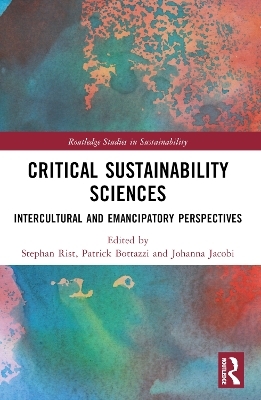
Critical Sustainability Sciences
Routledge (Verlag)
978-1-032-48797-7 (ISBN)
- Noch nicht erschienen (ca. Dezember 2024)
- Versandkostenfrei innerhalb Deutschlands
- Auch auf Rechnung
- Verfügbarkeit in der Filiale vor Ort prüfen
- Artikel merken
This book explores Critical Sustainability Sciences, a new field of scientific inquiry into sustainability issues. It builds on a highly novel integration of elements from relational ontologies, critical theory, political ecology, and intercultural philosophy in support of emancipatory perspectives on sustainability and development.
The book begins by uncovering the weaknesses of mainstream sustainability science and debates on sustainable development. The new field of Critical Sustainability Sciences has grown out of a deep engagement with relational ontologies, which helps to overcome the dualist ontology underlying mainstream notions of sustainability and development. Dualist ontologies reinforce problematic anthropocentric divisions, for example, between humans and nature, subjects and objects, mind and matter, body and soul, etc. Examples from indigenous peoples in Bolivia, India, and Ghana – as well as integrative movements in Chile, Brazil, and Europe – show that relational conceptions of life, rooted in ecosophy and cosmosophy, can provide an intercultural philosophical foundation for Critical Sustainability Sciences. The book concludes by describing three key topics for exploration in Critical Sustainability Sciences: societal reorganization in view of emancipatory, existential, and cognitive self-determination; living labor and commons; and the development of new comprehensive relational scientific paradigms.
This book will be of great interest to students, scholars, and practitioners of emancipatory and intercultural approaches to sustainability and development.
Stephan Rist is Professor Emeritus of Human Geography at the Institute of Geography at the University of Bern, Switzerland. Patrick Bottazzi is Assistant Professor at the Institute of Geography, at the University of Bern, Switzerland. Johanna Jacobi is Professor at ETH Zürich, Switzerland, where she leads the Agroecological Transitions Group.
1. Why do we need critical sustainability sciences? 2. Key areas for critical sustainability sciences 3. A culture that understands that everything is interrelated, that nothing is divided, and nothing is outside 4. Relational Ontologies in health sciences and practices in India 5. Cosmovisions and critical sustainability sciences: An African ontology of "Vurr" (an energy) amongst the Dagara of southwest Burkina Faso and northwest Ghana 6. Contributions of the notion of cosmosophy to the formulation of critical sustainability sciences 7. Towards a "nature alliance": why sustainability must be rethought in terms of relationality 8. Society–labor–nature: the potential of conflict 9. Regenerative work: from commodity to collective action 10. Food, food systems, and sustainability: Elements of the "real food" debate in Brazil 11. Agroecology as a transformative approach to sustainable food systems 12. Through the veil: a relational and participatory perspective to knowledge production and sustainability 13. Goethe’s scientific method: the road not taken 14. Sustainable design: a critique of the tripolar sustainability model, 15 years later 15. Outlook and key topics for the construction of critical sustainability sciences
| Erscheinungsdatum | 05.06.2024 |
|---|---|
| Reihe/Serie | Routledge Studies in Sustainability |
| Zusatzinfo | 1 Tables, black and white; 17 Line drawings, black and white; 1 Halftones, black and white; 18 Illustrations, black and white |
| Verlagsort | London |
| Sprache | englisch |
| Maße | 156 x 234 mm |
| Gewicht | 453 g |
| Themenwelt | Geisteswissenschaften ► Philosophie |
| Naturwissenschaften ► Biologie ► Ökologie / Naturschutz | |
| Sozialwissenschaften ► Soziologie ► Empirische Sozialforschung | |
| ISBN-10 | 1-032-48797-6 / 1032487976 |
| ISBN-13 | 978-1-032-48797-7 / 9781032487977 |
| Zustand | Neuware |
| Haben Sie eine Frage zum Produkt? |
aus dem Bereich


